A report summarizing the shocking facts such as 'about 38% of people listen to music in an irregular way' will be released

by
The International Federation of the Phonographic and Video Producers (IFPI), an international music industry group based in the United Kingdom, has released a report analyzing trends in music consumers around the world. The report summarizes the shocking facts about global music consumption, such as 'YouTube accounts for 47% of music streaming services' and '38% of all music consumers listen to music by non-legitimate means'. Has been done.
091018_Music-Consumer-Insight-Report-2018.pdf
(PDF file) https://www.ifpi.org/wp-content/uploads/2020/07/091018_Music-Consumer-Insight-Report-2018.pdf
YouTube accounts for 47 percent of music streaming, study claims
https://mashable.com/article/youtube-47-percent-of-on-demand-music-streaming/
Globally, Almost Four Out of Ten Music Consumers Are Pirates --TorrentFreak
https://torrentfreak.com/globally-almost-four-out-of-ten-music-consumers-are-pirates-181010/
From April to May 2018, IFPI conducted a survey of music consumers aged 16 to 64, and found that people listen to music on average 17.8 hours a week, per day. People are listening to music for about 2.5 hours. We also found that 86% of music consumers use on-demand music distribution services, and 75% use smartphones as devices for listening to music.
When asked 'what to choose if you can only listen to music by one means' to young people aged 16 to 24, 50% answered 'music distribution service'. There are various music distribution services such as YouTube Music, Spotify, Amazon Prime Music, etc., but 38% of all users also listen to music using pirated editions and download services that infringe copyright. It is known by investigation.
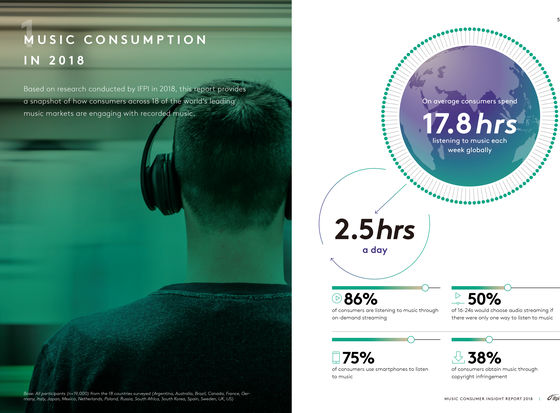
There are many different situations in which people listen to music, with 66% of people in the world 'listening to music in the car.' In countries such as South Africa, Germany and the United States, more than 75% said they are listening to music in the car. It was also found that about 40% of people listen to music while studying or working. Especially in Mexico, as many as 68% of people listen to music while working or studying.
Some people listen to music when they are relaxing (63%), doing household chores (54%), exercising (36%), and about 19% of people in the world listen to music when they go to bed at night. There seems to be. Also, young people between the ages of 16 and 24 tended to listen to music longer than in other age groups.
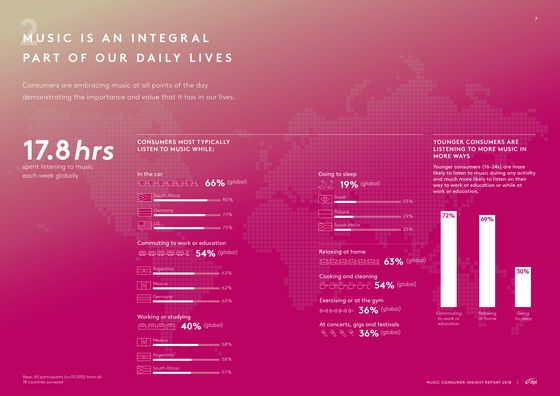
As for popular music genres, pop is 64% in 1st place, rock in 2nd place is 57%, dance / EDM in 3rd place is 32%, and movie instrument is 30% in 4th place. In addition, Japan (66%), South Korea (62%), and France (69%) were listed as countries with high music consumption in their own countries. In Japan, nearly two-thirds listen to J-Pop, and 29% listen to anime-related music.
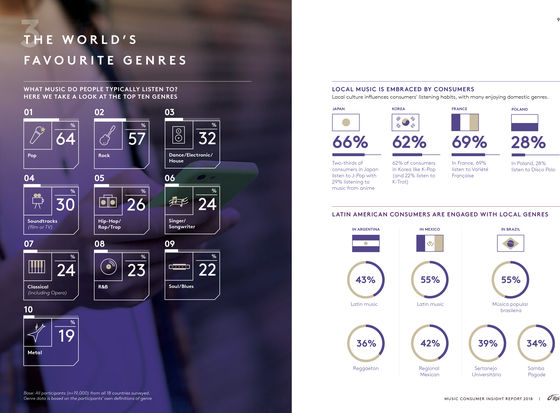
Smartphones are also gaining great popularity as a device for listening to music, and it is said that 27% of the total time consumers listen to music is listening to music on their smartphones. When asked to young people between the ages of 16 and 24, 'What would you choose if you could only listen to music on one device?', 58% said 'smartphones.'
Countries such as Mexico (93%), Brazil (92%), and Argentina (89%) are ranked as countries with a high percentage of smartphones used for music playback. Also, 30% of people say they follow their favorite artists on social media.
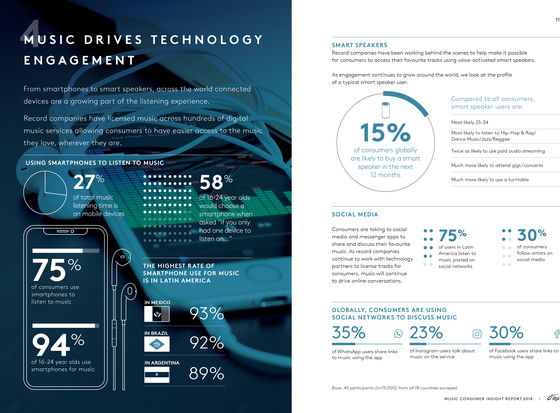
The number of people who listen to music using music distribution services is increasing all over the world, and as many as 86% of all users use on-demand music distribution services. On the other hand, many people do not pay for music distribution services, and 47% of those who use music distribution services answered that they 'listen to free sound sources on YouTube.' Another 20% of people use free music distribution services, and only 28% are paying for the music distribution service itself.
The survey also found that radio users are also persistent. Eighty-six percent of people say they listen to music on the radio, and 25% of the total time they listen to music comes from radio broadcasts. Looking at the percentage of people who use radio by country, it seems that more than 80% of music consumers use radio in many countries, but South Korea (66%) and Japan (50%) are in the world. Looking at it, it is a low number.
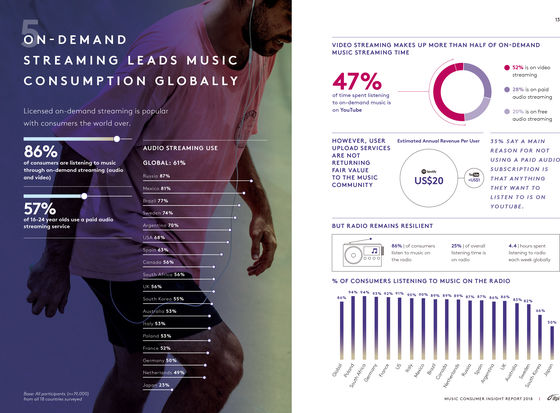
Unfortunately, as many as 38% of music consumers listen to music delivered or uploaded in a way that violates copyright. The music industry is increasing pressure to sue against
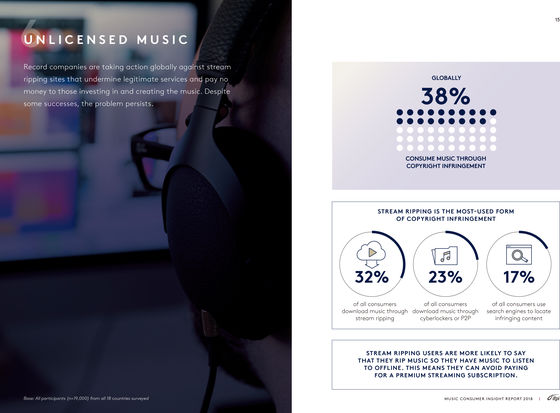
In populous China, as many as 96% of people consume music. 89% of people use streaming services, and the total time spent listening to music a week is about 15.5 hours. It also shows that many people share their favorite music on SNS such as
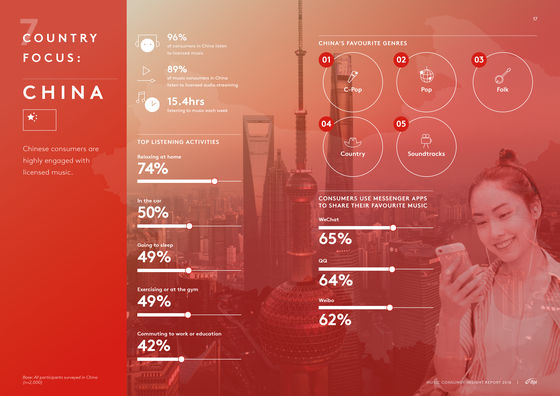
In India, which has a large population like China, 96% of music consumers use smartphones to play music, which is the highest percentage of music consumers in the world. Also, it seems that 96% of people listen only to music that does not violate copyright, and it turned out that a large proportion of people listen to music in a legitimate way.
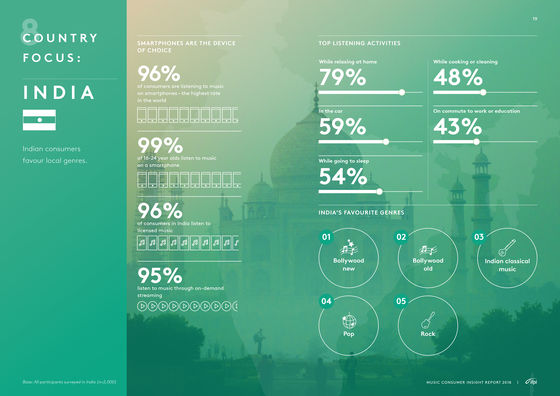
Looking at the report released this time, it is clear that the wave of digitalization is rushing into the music industry. In the future, the music industry is expected to focus more on music distribution services than ever before, and to eradicate illegal music download services and pirated editions.
Related Posts:
in Note, Posted by log1h_ik







